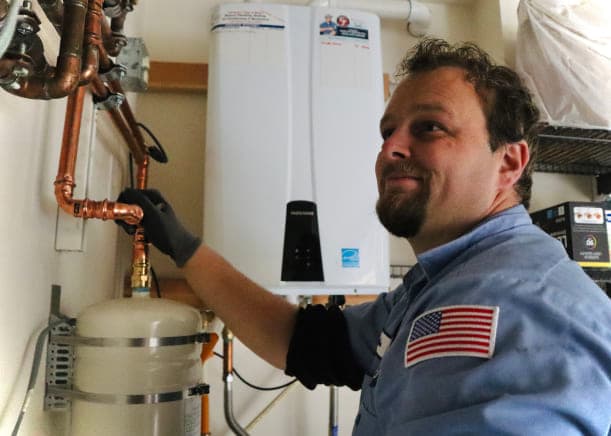Have you ever felt that sinking feeling when your shower suddenly runs cold? We’ve all been there – shivering like crazy with shampoo still in our hair. Ugh! When your water heater decides to act up, it’s more than just an inconvenience. It’s a plumbing crisis that no Seattle homeowner wants to deal with.
With our frigid winter temps, you can’t afford to have an inefficient or unreliable water heater letting you down. Those icy morning routines are brutal enough without an ice-cold wake-up call from your shower! You need a hardworking tank or on-demand system that’ll keep those hot water streams flowing no matter how frosty it gets outside.
In this guide, we’re breaking down everything Seattle homeowners need to know to select the perfect new water heater. We’ll cover sizing, efficiency ratings, tankless vs. tank models, and more. You can say goodbye to disappointing dribbles of lukewarm water and hello to endless supply of soothing, steamy showers and piping hot baths! Your future self will thank you.

Understanding the Different Water Heater Choices
You have several options for water heaters out there. Let’s discuss each type!
Traditional Tank Water Heaters
These have been around for a long time and are the tried-and-true option. Using gas or electricity, they heat up a big insulated tank full of hot water at all times. Reliable for sure, but they’re energy hogs since all that stored hot water is constantly losing heat to the surrounding air over time.
Tankless/On-Demand Water Heaters
If you tend to be more of a commitment-phobe when it comes to appliances, tankless could be up your alley. Rather than storing gallons of hot water, these only heat the water as you need it. They use gas burners or electric coils. Generally more energy-efficient than tanks since there’s no constant reheating happening.
Hybrid Heat Pump Models
Think of these as having a little energy-saving sidekick working for your home’s water heating. Heat pump hybrids capture thermal energy from the air around them and transfer it into an insulated tank using an electric pump. This is an eco-friendly choice that can help you reduce utility costs.
Solar Water Heaters
Just because we live in rainy Seattle, doesn’t mean these are out of the list – we still get enough sun to make solar water heating worthwhile. These solar systems use the sun’s energy to directly heat water stored in a tank or pipes. It’s a great option for homeowners looking for greener options.
Condensing Gas Water Heaters
These are very efficient. They recapture hot exhaust gases that would normally escape and use that heat to pre-warm the incoming cold water supply before heating it fully. Clever plumbing tech for sure!
Fuel Types and Energy Efficiency
Alright, let’s talk energy sources and savings! The type of fuel your water heater runs on plays a huge role in its overall efficiency and operating costs. In an eco-conscious city like Seattle, making smart energy choices is key.
Electric Water Heaters
These bad boys run on good ol’ electricity to heat up your hot water supply. Simple, straightforward, and a solid choice for Seattle homes – especially if you’ve already gone all-electric to reduce your carbon footprint. Just be warned that electric models can be a bit pricier to operate month-to-month.
Gas Water Heaters
Fueled by natural gas, these water heaters tend to have lower energy costs compared to electric. The downside? You’re still burning fossil fuels which isn’t as environmentally friendly. But for cost-conscious Seattle homeowners looking to save on utilities, gas is usually the most affordable heating option.
Propane and Oil Heaters
A little less common around these parts, but still options! Propane and oil-fired water heaters may make sense if you live off the grid or your home already uses these fuel sources. Just know that they’re not the most eco-friendly or cheap to operate long-term.
Energy Star Ratings
Doing your research? Smart! Look for that famous Energy Star logo which rates appliances on their energy efficiency. The more energy stars, the more you’ll save on utility costs over the water heater’s lifetime. Definitely a worthwhile investment upfront.
Seattle’s Power and Utility Costs
Speaking of utility bills, you’ll want to factor in our local energy prices too. Electricity rates are pretty average in Seattle, while natural gas tends to be a bit higher than the national average. So those gas water heater savings could get negated depending on your household’s hot water usage.
Key Factors to Consider When Choosing a Water Heater
Alright, let’s get into the nitty-gritty details you need to mull over when selecting your new water heater soulmate. There are several key factors to weigh based on your specific home and lifestyle.
Home Size and Water Usage
If you’ve got a huge household with people constantly showering, running laundry and dishes back-to-back, you’ll likely need a heavy-duty water heater that can keep up with all those hot water demands. But a smaller family or couple who goes easy on the hot water could probably downsize to a more compact model. Get real about your daily hot H2O demands.
Water Heater Capacity
For those traditional tank-style heaters, you’ll want to size up if you’ve got a big crew at home. An 80-gallon Godzilla tank will fare better than a puny 40-gallon option when the hot water is constantly flowing. As for those trendy tankless models, pay attention to the flow rate – the more gallons per minute, the more showers and faucets it can handle simultaneously.
Energy Efficiency
In an expensive energy market like Seattle, going green can seriously save you some green! Look for those Energy Star certified water heaters – the more efficient the model, the more you’ll save month after month on utility costs. Some units may even qualify for cool rebates or tax credits.
Space and Installation
Doing some remodeling? Don’t forget to measure that cramped closet or basement nook where your new water heater will live. Tankless versions are super space-savers, while those big tank models need a decent footprint. With all the cozy, older homes around Seattle, making it all fit can be tricky!
Initial Cost vs. Long-Term Savings
You know what they say – you gotta spend money to save money! Higher-end water heater models like tankless or hybrid heat pump versions can be pricier upfront. But their superior energy efficiency means you’ll start racking up utility savings pretty quickly to offset the costs. Just look at the estimated payback period and project out a few years to see if it’s worth the investment.
Pros and Cons of Different Water Heater Models
Alright, let’s break down the good, the bad, and the ugly when it comes to the different water heater varieties out there. Every option has its pluses and minuses – it’s about finding the right fit for your home and lifestyle priorities.
Traditional Tank Water Heaters
Pros: The OG water heater is still popular for a reason – those big tanks tend to be cheaper upfront and easier to install, especially if you’re just doing a swap. No crazy retrofitting required.
Cons: But they’re definitely not the most energy-efficient option out there. All that standby heat loss adds up on your utility bills. Plus, you’re limited to that finite tank capacity before running out of hot water. Oops, shower cut short!
Tankless Water Heaters
Pros: Say goodbye to running out of hot water! Tankless heaters provide an endless supply on-demand. They’re also way more energy-efficient since they only heat up water when needed. And you’ll save tons of space without that huge tank.
Cons: Prepare for that initial price tag though. And heads up – the installation can get pretty complex with all the venting and gas line requirements. Not a simple swap if you’re upgrading.
Heat Pump Water Heaters
Pros: If saving money is a priority, you’ll love these hybrid heaters! They use electricity very efficiently by pulling in heat from the surrounding air to warm the tank. $$$ stay in your pocket.
Cons: Just don’t expect crazy fast heating times. The pump system works slower than traditional tanks. And depending on the model, you may need to make room for a bigger footprint.
Solar Water Heaters
Pros: For all you eco-warriors out there, solar power is an awesome renewable option! You’ll save big over the long run by harnessing free energy from those sunny Seattle days to heat your water.
Cons: Upfront costs are no joke though, even with rebates and incentives. And of course, solar performance depends on our fickle Pacific Northwest sunlight. Rainy day woes.
Condensing Water Heaters
Pros: These gas-powered units are the energy-efficiency kings! They operate by capturing hot exhaust gases and using them to preheat the cold water supply. Genius! Great choice if you’ve already got gas lines run in your home.
Cons: You’ll pay a premium for their fancy exhaust recirculation tech. And installation can get complicated with all the venting requirements. But worth it for the energy savings!
Installation and Maintenance Considerations
After you’ve weighed all the pros and cons and picked out your dream water heater model, don’t just impulse buy it on Amazon and expect smooth sailing from there! You have to keep in mine some key installation and maintenance factors.
Professional Installation
Listen, unless you’re secretly a plumbing prodigy, this is definitely a job to leave to the licensed pros. Having your new water heater properly installed by a certified technician isn’t just the safe and smart thing to do – it’s required to comply with all the Seattle building codes and regulations. Especially if you’re doing a retrofit from a tank to trendy tankless system in an older home, there can be all sorts of venting, gas line and electrical curveballs to navigate. Don’t risk a botched DIY job!
Ongoing Maintenance
Your water heating workhorse needs some regular TLC to keep chugging along. For tank models, you’ll want to flush out all that yucky sediment buildup at least annually to maximize efficiency. And tankless units need descaling every so often to stay free-flowing. With Seattle’s mineral-rich water, that crusty buildup is inevitable over time if you don’t stay on top of it. Routine maintenance is key to making your investment last!
Warranties and Lifespan
Speaking of longevity, you’ll want to pay close attention to those manufacturer warranties too. A good one can save you big bucks down the road when repairs eventually pop up. In general, you can expect tank water heaters to stick around for 8-12 years, while more expensive tankless and hybrid models should make it 15-20 years with proper care. But don’t underestimate the value of that warranty coverage as the unit ages!
Don’t Let A Lukewarm Shower Ruin Your Day – Call Gene Johnson For A New Water Heater!
Alright, Seattle homeowners, there you have it – everything you need to know to pick the perfect new water heater for your humble abode. Whether you go team tank or join the tankless craze, prioritize energy efficiency or want to harness solar power, we’ve covered all the sizzling details.
But enough analysis paralysis! If your current system is failing and leaving you with ice cold showers in the morning, it’s time to bite the bullet and invest in a new one. Imagine the bliss of never running out of hot water again! Plus all those utility savings will make the upfront costs worth it in the long run.
Don’t risk a botched DIY disaster though. Leave the installation to the licensed pros at Gene Johnson. Our plumbing pros at Gene Johnson have you covered for a seamless installation and top-notch maintenance to keep that hot water flowing for years to come.
What are you waiting for? Stop putting up with those disappointing drizzles of lukewarm water and call us at (206) 792-7495 today!





